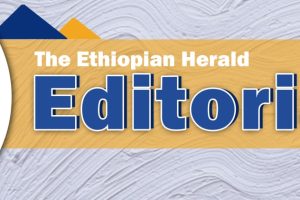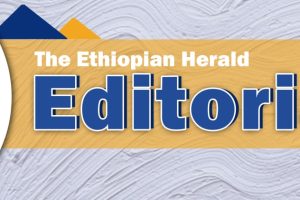
An eventful year to celebrate, new hopes for a new year!
Every year around this period we try to recap the major events characterizing the year. Everybody gets new emotions with the year winding up and a new one replacing it. Abandoning the old we embrace the new. Usually it is time for a fresh beginning and many try to plan for something new and hope to change.
In politics and public affairs, we try to recall the best and refresh our memories while trying to dismiss the negative but vowing not to repeat.
Ethiopia finds itself in a new trajectory. The advent of the new prime minister has definitely brought fresh air to the establishment. From a relatively unknown background he has become a worldwide celebrity with several acknowledgments and awards for his fervour and relentless commitment in advancing peace and stability in not only Ethiopia but also abroad.
Abiy Ahmed symbolized hope and optimism for all Ethiopians when the year 2011 dawned. The year indeed began with lots of plans and projects and some are still ongoing. His main area of focus was as he repeatedly stated the termination of all unfinished projects that are a source of concern to the government as potential liabilities.
Among the few new projects we can name the ones that concern the capital city including the environment friendly greening Addis and cleaning Sheger: The river project.
The year 2010 was impressive in terms of enthusiasm for the new faces of the government. The transfer of power from one prime minister to another was unprecedented in March to be confirmed at the party’s Congress in Hawassa!
One of the phrases I used then in a similar article was: It can very easily be asserted that Ethiopians are now living special moments, special days, and special feelings. They are excited by what is going on in the country and some do not even believe that what they are experiencing is too good to be true. For them it is very difficult to contextualize and appreciate the momentum.
No one even in their wildest dreams would have expected that such a momentous year would have come when we inaugurated the year 2010. And yet everyone except a few has been craving for such change.
February and March were key months with the former prime minister resigning, scores of detainees released and a fresh air filling the political atmosphere.’
Those were the words that summarized the year 2010. But can we summarize this year as well with similar statements? This is a question to be asked. How much of the premises were fulfilled and how many of them have been shelved or been openly discarded for clear impossibility or postponed due to unforeseen developments.
Certainly the biggest challenge for any government is the economy even for well-developed countries such as the US. Everybody says as long as the economy is going well the President can afford to do or say anything he likes, and few people would actually care.
Bringing back people to work and guaranteeing their economic security has always been the first headache of any leader. But Ethiopia’s case is even more than that. The year 2011 began with great hopes and expectations but no one could assert today that the same feeling is shared by all, a full year later on. The hard reality is indeed challenging.
Definitely this government cannot be blamed for doing little or not exerting all its forces to stick to its pledges. But there are also many other elements that actually impact the way politics is managed; and in a transition such as what we are experiencing there are several forces who do not actually share the same feelings as the premier’s equip, even in the ruling party itself.
The issue of nationalities has been a hard nut to crack and has created complications in many areas. Peace and security have been jeopardized by self-made ‘warlords’ or local personalities.
The role of the social media in this context has been crucial. The world free press day was celebrated here in recognition of Ethiopia’s efforts to open up the media but challenges remain. Ethiopia is exploring avenues of legal protection from such abuse. Incidentally this is a worldwide challenge.
The various factions and forces that ignite unrest here and there have been regrettably hampering the efforts of the government. One would say that politics is all about accusations and counter accusations; claims and counterclaims and even if there are so called activists and localized politicians that try to fish in troubled waters the incumbent has continued to steer the ship to the right direction.
Opposition is admitted. It is legitimate being one pillar of any democratic system; but only constructive opposition and opposition within the framework of the law and the constitution fits our situation.
The premier has given a couple of press conferences during the year and made a couple of appearances in parliament where he seized the opportunity to clear his government’s position. No wonder that all these negative events did have some reflection on the kind of support the premier had enjoyed almost to unbelievable approval rates last year at this stage.
Inevitably politics cannot be the art of pleasing everyone and even more so in a scenario such as Ethiopia. It would be a miracle to seek or obtain the approval of every interest group.
The premier himself has repeatedly said that ‘what we can do is listen to all voices, consider those reasonable and legal and then try to adopt something that can converge into a majority’. The discussions that the prime minister’s office organized are to be viewed in this context. We need to talk and communicate and get to know each other and only thus can the seeds of hatred and misunderstanding wither away leaving the space for harmony.
The year 2011could be well characterized by a wide range of democratization process, placing women and youths at the forefront of public offices. Beginning with the head of state to half of the ministries, the Supreme Court and the National Electoral Board are now led by women. Two women ministers (Peace and Income Revenue) have been praised for their extraordinary achievements.
The diplomatic successes of this government and in particular of the premier could very easily be listed among the top points of the year. The premier was showered with several praises and awards for his initiative in the peace endeavors.
His tentacles were observed even beyond the Horn to the Gulf area and for that the country has definitely profited because the image of Ethiopia as a country, real player in international diplomacy is appreciated.
The tremendous efforts to stimulate the tourism industry (viewed as one of the engines of growth and the sources of foreign currency) are definitely among the points to raise when we look back this year.
Beautifying Sheger is part of this huge campaign, and rediscovering the history of Ethiopia through the palace renovation as a museum.
The pace of progress and achievements of the government may not be as we recorded last year at this time with the exceptional 100 days and the one year recurrence. But, all the same the significance and achievements of the year in many respects cannot be undermined.
Shortcomings are inevitable for various reasons not least experience. There have been some reshuffles in government and the dynamism continues. The focus on the respect for law and order has increased and the institutions that are entrusted with the task of working for peace and reconciliation can be mentioned here. The government’s efforts to assign the right tasks to the right people are indicative of its intentions whatever critics might conjecture.
Its efforts to green the country, the July 29 Green Revolution and the four billion tree seedlings to be planted this season say a lot about what we need and can do in unity. The tremendous success in this regard is a huge credit to the government.
Very challenging events some very sad have crossed this year with their repercussions on the very texture of the nation. That is why the recognition of such fact by the government becomes key. If we admit the problem we can be sure of looking for a solution.
Why is the academic standard of our schools so low? A new roadmap has been introduced and the prospect can only be better.
The way the staff and leaders of National Electoral Board and the Human Rights Commission have been chosen tells us something about the democratic trajectory underway. It was repeatedly stated that democracy for this country is not a matter of choice; but one of survival.
Addressing economic issues (unemployment, inflation, foreign currency, investment and export….) have presented a real challenge beside the guarantee for rule of law; issues the government has been working on. The premier has acknowledged the threats and pledged to work aggressively with every resource.
The various diplomatic ventures of the premier including the very recent visits to the Far and Middle East have been symptomatic of such plan. Ethiopia does need strong partners in development and that is what the premier has been in search of.
Indeed, no easy solutions exist, but belief and hard work are vital if we want to have a new year blessed with new successes.
The Ethiopian Herald Sunday September 8/2019
BY FITSUM GETACHEW




